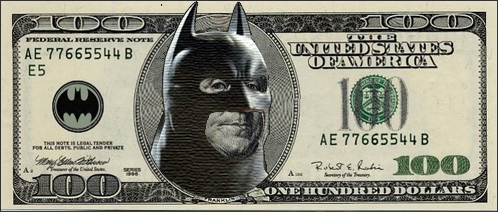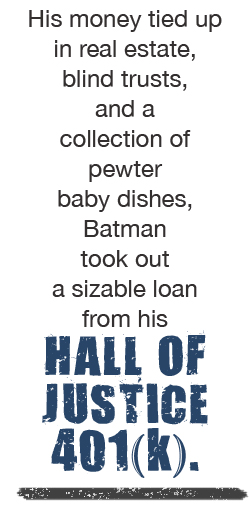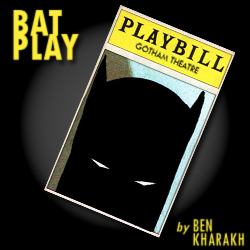
| S |
uspended from a meat hook, hanging upside down with his hands bound behind his back, Batman gently swung over the shark tank. It was the fall of ’83, and he had spent the better part of the year tracking the Joker back to his hidden lair, only to be gassed unconscious when he broke in. When he awoke, he was inches away from being eaten alive, and the Joker was detailing his plan to destroy all of the earth’s coal and ransom every industrialized nation. As he was loosening the bindings around his wrist, Batman said, “Any other secret plans, Joker?”
The Joker flipped the switch, slowly lowering Batman into the shark tank. “Sure, he said, buy Microsoft stock,” and left the room. Batman totally thought he was joking.

Most of his money was tied up in real estate, blind trusts, and his collection of pewter baby dishes, so to pay for the Batcave’s modernization, Batman took out a sizable loan from his Hall of Justice 401(k). Then came the fuzzy video clip of him at some party referring to Captain America as Captain Guantánamo, and talking about putting Batgirl into some “stress positions.” His termination came swiftly and, needing cash to pay back his loan, he ended up liquidating several real-estate holdings at significant losses and selling off a majority of the dishes in his collection to Thor for next to nothing.
Healthcare stocks—that was the answer. Over the course of a week, Batman dumped 70% of his remaining fortune into can’t-miss shares of Supergen, AstraZeneca, Genentech, Wyeth and a penny stock of an outfit that discovered some sort of blood-clotting agent for squirrels. Alfred, ever curious, ever concerned, asked, “Sir, you feel confident enough to risk that much?”
“I do,” said Batman.
“And you’re O.K. putting your bets all in one sector?” asked Alfred.
“I never questioned it,” said Batman.
“Why?” asked Alfred.
“I was not anticipating that question,” said Batman.
Two months later, his healthcare portfolio was down 78%. Batman regretted the decision just as much as when he changed his superhero identity to “The Taco Maker” for a year, and the original Taco Maker sued him for copyright and licensing infringement.
With dwindling capital at his disposal, Batman decided to “reinvigorate his brand” by financing a movie based on his crime-fighting exploits. He imagined a high-octane, car-chase filled epic, hiring a novice director and investing most of the budget into the action sequences. The first cause for concern was when the director’s first draft of the script was presented in crayon. Then, when the shooting started, Batman realized that whenever the director said, “Let’s get down to business,” he didn’t mean the “let’s work hard to get some results” business, but meant the sitting down on the toilet kind of business. An untreated case of mask rash that sidelined Batman for weeks led him and the producers to finally pull the plug on the movie.
“We need to talk,” said Batman to Batgirl. A prime-rib dinner, a few mojitos and a stealth trip to the restaurant cloakroom later, Batman and Batgirl had seemingly made up. Strapping back on his utility belt with a newfound confidence, Batman said to her, “Am I your Dark Knight or what?”
“More like the Flash,” she replied dismissively. He lost no actual wealth that night, but, man, you just can’t put a price on hurt like that.
In his heart, he thought it would work. And Alfred had built a good case. And who could discount someone with that kind of an accent?
“Tell me how it works again,” said Batman.
“You see, sir, it’s quite easy,” said Alfred. “What you—Batman—do is sell something like the Batmobile to Bruce Wayne, who then leases it back to Batman. Batman takes the proceeds of the sales, invests it and uses the interest to pay off the lease. Bruce Wayne gets the lease payments and the write-downs. Win-win, sir.”
A year later, after the financial meltdown, unable to raise the $24 million he owed to himself, Batman pondered the wisdom of these sale-leaseback agreements, as well as the jewel-encrusted replica of the hat Aretha Franklin had worn to the inauguration. (“Don’t tell me that’s not unisex,” said Batman to the Neiman Marcus saleswoman.) Bankruptcy and the downward spiral of debt were inevitable. In an act of desperation, Batman took a dive fighting the Riddler to get rid of some old gambling debts. But his finances were still overdrawn and his creditors were too many. He fell victim to midnight calls from agencies demanding money, and he continued getting visits from burly men wielding bats. The irony was not lost on Batman.







